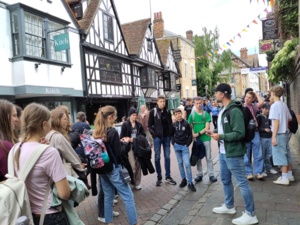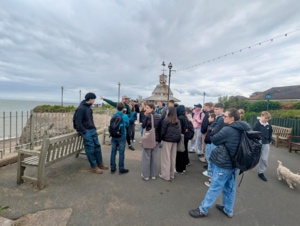Broadstairs 2025

Broadstairs 2025
Vom 25. bis zum 31. Mai 2025 konnte wieder eine - große! - Gruppe von Neuntklässlern ihre Englischkenntnisse im beschaulichen Küstenort Broadstairs an einer der dortigen Sprachschulen verbessern. Auf dem Programm standen neben Unterricht mit muttersprachlichen Lehrkräften auch Ausflüge nach Canterbury und London, sowie einiges an Freizeitaktivitäten. Anstelle einer Nacherzählung dieser ereignisreichen Woche haben wir uns für eine Wortsammlung entschieden - schließlich war es ja ein Sprachaufenthalt. Hier ist es also, das endgültige und lang erwartete
Broadstairs Dictionary
Would you like alfafa on your pizza? Is your food bland or scrumptious? Or are we having leftovers? Do you know all these words? Splendid! If you have no idea, not even the slightest hunch, then you are in a pickle, aren't you? And then you should definitely - chop chop! - check out the "Broadstairs dictionary" below. You'll be gobsmacked by the sheer variety of words our students came up with when we asked them which words and expressions they found most interesting during the week of our stay in Broadstairs. It all turned out to be a serendipitous course of events and was - fortunately - very far from being a wild goose chase!
Further down you'll find pictures of our activities and visits, as well as unique photographic evidence of German attempts to master the hitherto little known but soon to be made olympic sport of "welly wanging". (welly: Wellington rubber boot, size 10; wang: throw as far as possible - just look at the pictures; one must see it to believe it.)
Text: Stefan Edelmann
Photos: Stefan Edelmann, Anna Tott, Simon Wulf
My word is Alfafa because we ate pizza with our host family and she asked if we want alfafa and we found the word very funny. It means “Luzerne” – something like “Kresse”. (Max)
I learned the word black pudding during an English lesson in Broadstairs. We were talking about traditional British food, and I was surprised to find out that black pudding is very similar to the German Blutwurst. I think it’s interesting because it shows how different cultures have similar dishes, even if the names and ingredients vary a bit. (Moritz)
I learned it in our class today also from the poem The pig and I find the pronunciation sounds nice and it means when the food tastes like nothing then you say it is bland food. (Anton)
It is a Welsh word which means something like my love/my darling. The Welsh people say it to someone they really love. My host mother says it to her husband. (Isabell)
A chatterbox is someone who talks a lot, often without stopping. I learned the word in the English lesson on Monday, and it perfectly described our host (Vincent)
I learned it in class, and it means something like quickly, or at least that is what my teacher told me. I do remember this word because after I asked him what it meant he always said “schnell, schnell” instead of “chop, chop”. It sounded really funny when he said it. (Annika)
I chose the word “clover” because on the first evening in our family the girls and I were guessing what the word on the butter packaging meant and today we were talking about it in our English lessons and I learned that in England the people call it “shamrock”. (Magda)
It's a Welsh word and it means something like a hug but it's more loving and safe. I find it interesting because I think it's very cute and there is also a saying that goes like this: Everyone can hug but only the Welsh can cwth. Man spricht es “Cutch” aus oder so ähnlich (Evelin)
I learned this during our costal walk and it is a unofficial trail that forms where people repeatedly walk the same way usually cutting across open land. (Leon)
It's a synonym for wirework and describes how wires and cables are mounted on to the wall or inside the fusebox. I talked about it with my host and she also thinks it's horrible in England. (Hannes)
I chose this word because it was my first time on a ferry. (Tobias)
I learned it in Class on Wednesday. It means to search for food or supplies, especially in the wild. (Fabian)
Very sweet and similar to a sweet treat from Kasakstan, where I come from. (Sanzhar)
One of our activity leaders mentioned it while we were talking. I looked it up later because I wasn't sure what it meant. It means being totally surprised or amazed by something. I was gobsmacked by how fast our time in Broadstairs flew by. (Juna)
Why I find it interesting: I find the word heritage interesting because it represents the traditions, history, and cultural identity of a country like England. England has a rich heritage with centuries-old buildings, literature, and customs that are still celebrated today. It shows how the past continues to influence the present. (Anna)
This word describes a certain feeling about something, based on intuition rather than on facts. We learned it in class, and I like it because I often have to trust my intuition in things too. For example, when I’m speaking English. I’ll never be 100% sure, if what I’m saying is correct, but I’ll just have this hunch about it… (Rosa)
I learned it in class, and you say it to express that you don't like something (or someone). I choose it because i think it is a nice way to say that you dislike it. (Annika)
I learned it, when my host family said we were having leftovers for dinner. It's food that is not eaten during a meal and is saved to eat later. (Fabian)
I love the word because it sounds so funny. The meaning of the word is to walk around and try to catch up as much information as you can. We also had a Mingle on Monday the “Monday Mingle”. (Hannah)
I learned this one from my host and it means the street where all the cars drive for example when you go on vacation. (Lina)
I learned it in class, when we talked about identity. It means that something or somebody has many sides or aspects. It stuck with me, because you can use it for almost everything, because very few things are just black or white. (Magdalena)
Being in a bit of trouble or in a stressfull or difficult situation. The word originated from Shakespeare’s play “The Tempest” and is still commonly used today. I think it's a really funny expression or phrase because its meaning is not really obvious when you first hear it. (Noah)
It seems to be very simple, but it doesn’t mean cake in this context like we in our host family thought. In England it’s also a traditional food with pastry and meat in between which is very interesting in my opinion. We also ate it yesterday. (Felja)
For someone who leaves a path of destruction (adapted meaning). (Herr Wulf)
I learned it in our class in a poem called “The pig” I think it’s a cool word from a cool poem and it’s another word for regretting something. (Maja)
My host mom always calls her dachshund a savage sausage. It’s pretty funny and actually describes the dog perfectly. The dog is wild, and her looks are brutally honest, constantly giving me side eye. (Max)
It's another word for delicious which we learned today, and I think it perfectly describes our food here. (Niclas)
I learned that word from our host It means something makes sense. (Sebastian)
Serendipity refers to an unplanned fortunate discovery and is often associated with accidental discoveries that lead to valuable insights or inventions. I learned the word in the English lesson on Monday, and it was a serendipity to find one pound in London on Tuesday. (Johannes)
It’s a little window between the kitchen and the dining room and it’s used to serve dishes and to put them back into the kitchen once you’re finished. My host “mum” says you find it very often in houses built in the seventies - which is also true for Germany where we call it “Durchreiche”. (Herr Edelmann)
I learned it during a lesson, and it describes a container made of glass. Inside the showcase important objects are kept. So, they can be looked at without being touched. (David)
To avoid school or work by pretending to be ill or making up an excuse. German equivalent: “blaumachen”, “schwänzen” (Max)
It means that you should blow your horn on a curve to warn, for example, pedestrians. I saw it on a sign standing next to a small road leading to the beach. (Loucian)
It means something is really great or amazing. It’s like saying “awesome” or “fantastic”. (Mina)
If you have several options of which you would like to do all but you have to decide for one. (Herr Wulf)
Our host mother asked us what sort of crisps we want to have and one option was salt and vinegar. Now I know that it is the sour liquid that we often pour into our salad. (Lea)
I chose this word because it represents England well. In London, as well as in Canterbury, everything was very vivid, as there is so much culture, history, and many sights there. Overall, I thought the word was very good and fits our current location well. (Laurin)
I learned it during a lesson, and it describes a search after something that is completely unsuccessful and a waste of time because the person or the thing doesn’t exist. (Benjamin)
I learned it during a lesson, and it represents the bad lives of poor people during Queen Victoria's reign. Poor people had to work there just for a bed and meal but not for money. It was like a prison for poor people because the conditions were very bad there. (Elias)






